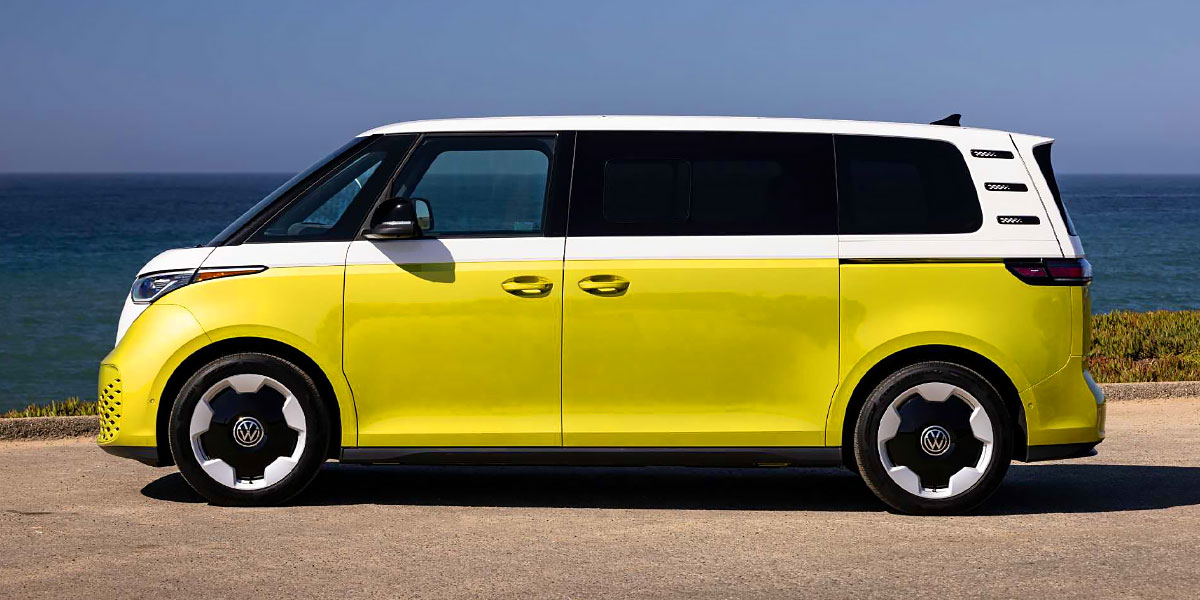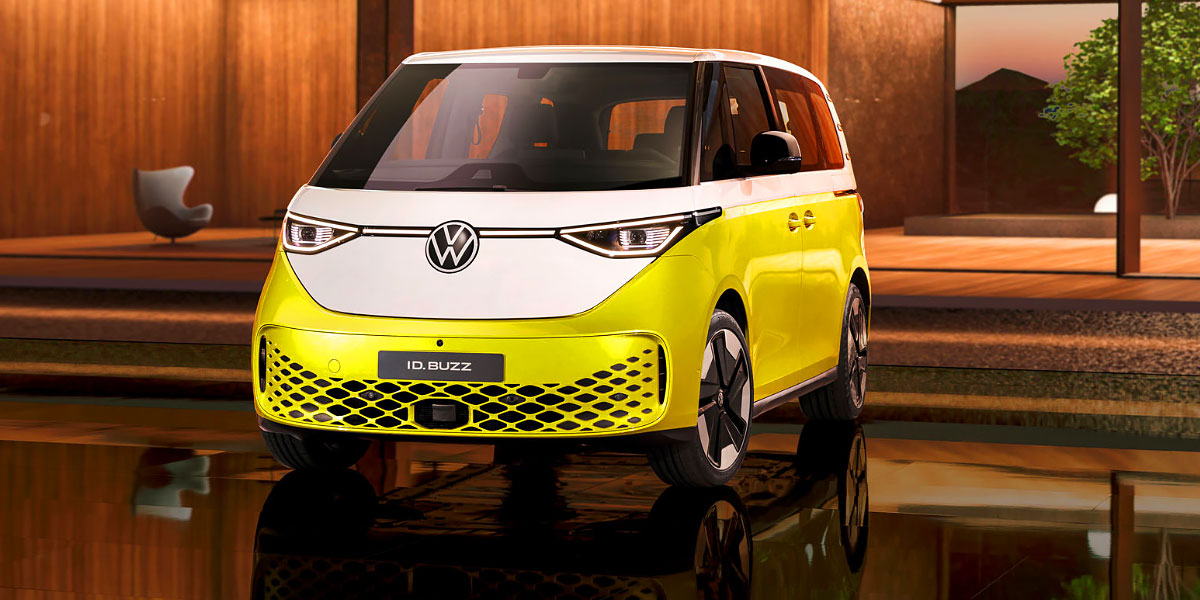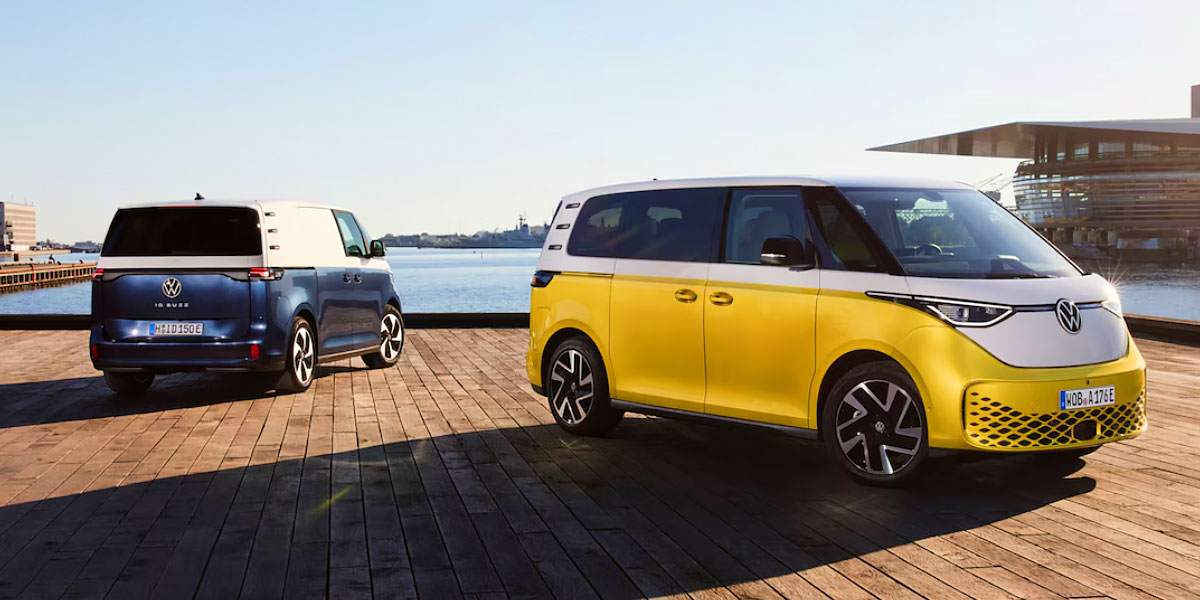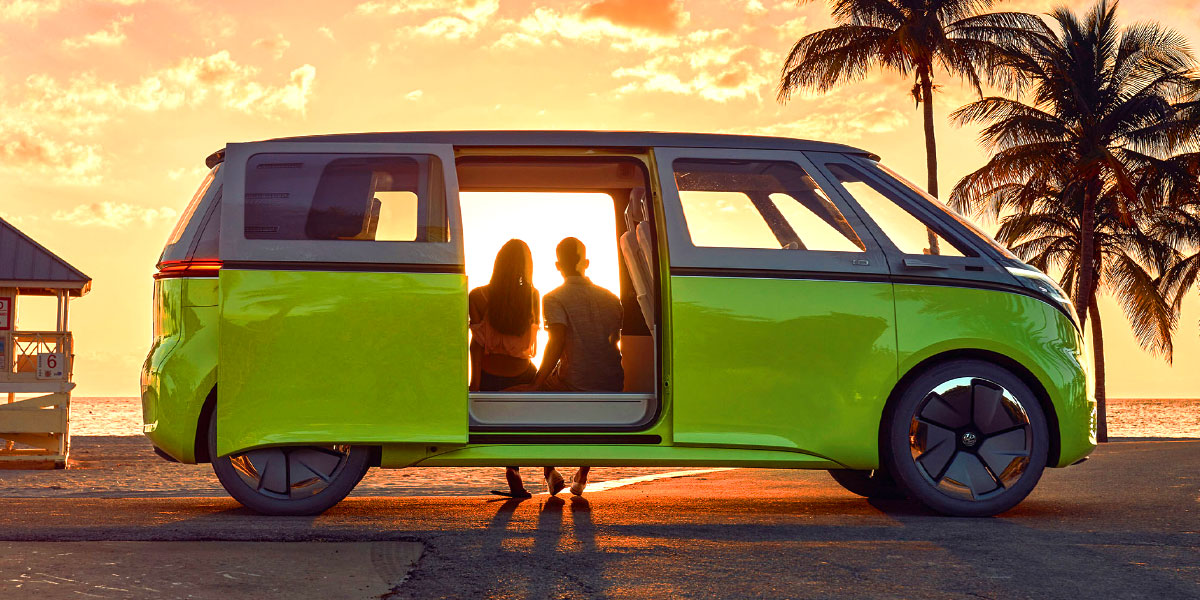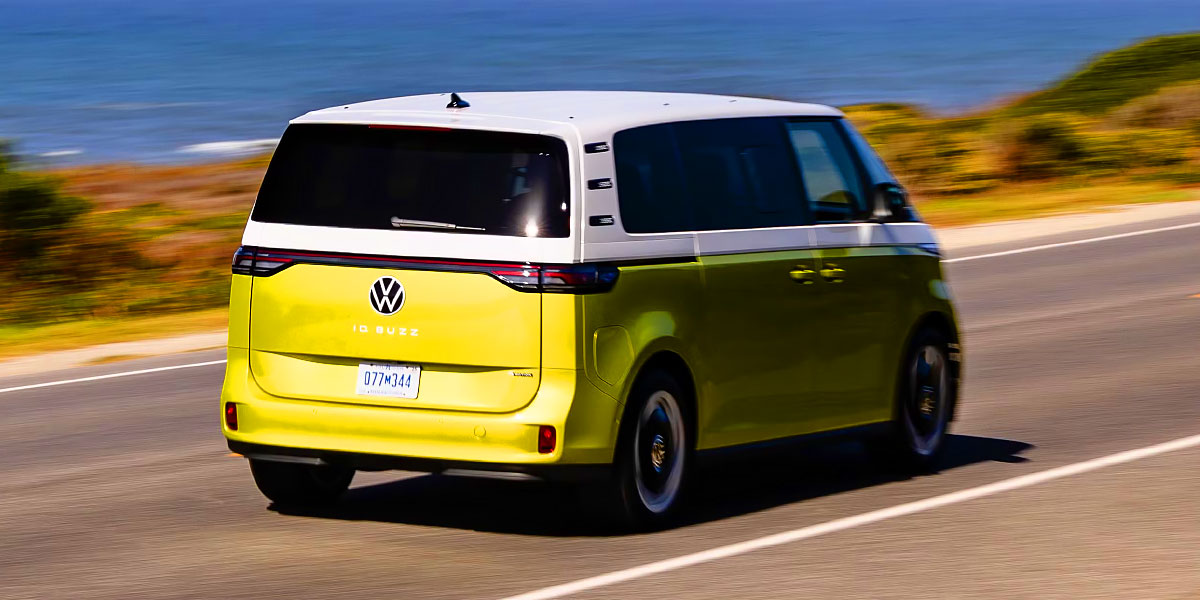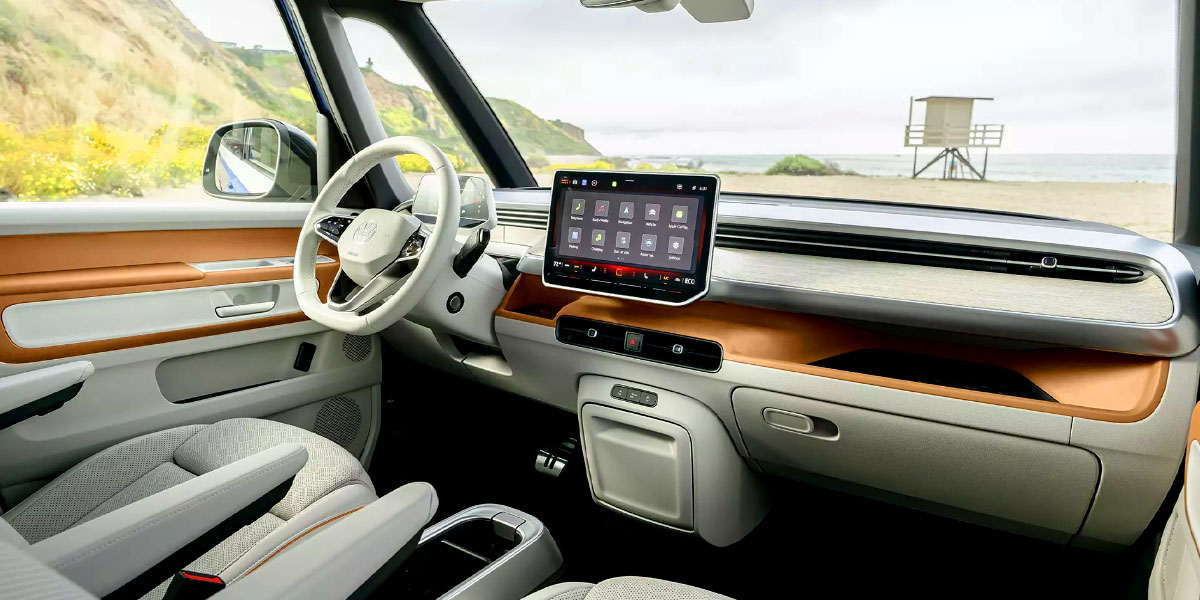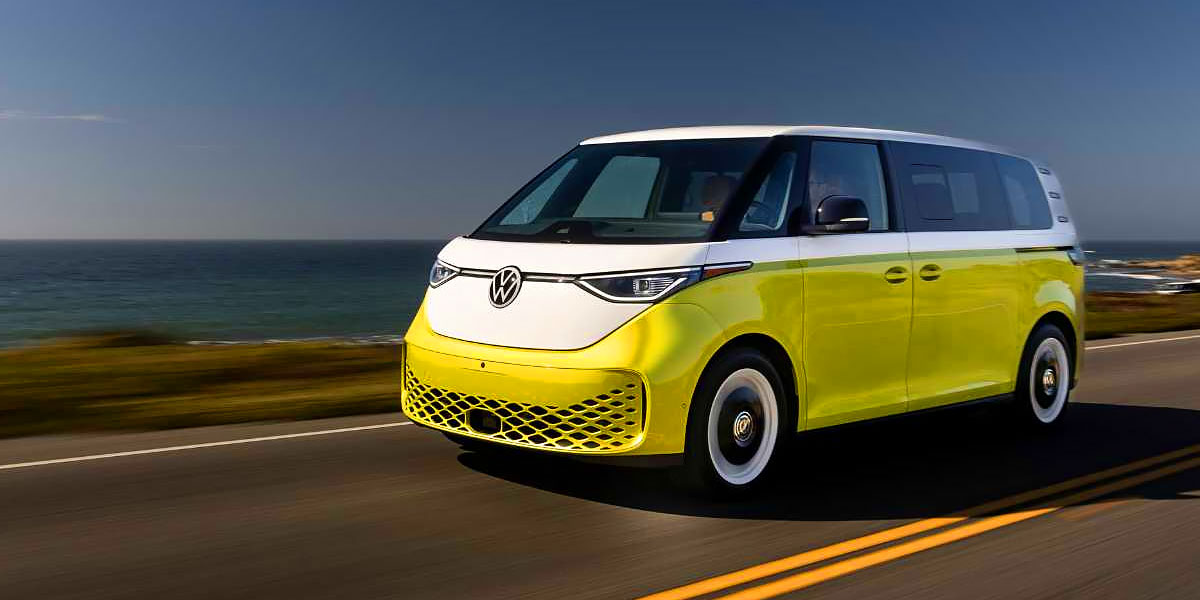Volkswagen ID. Buzz NWB Pure
The Volkswagen ID. Buzz NWB Pure is Volkswagen's electric tribute to the classic Microbus, starting from US$ 52,300. It offers a 310 km range on a 63 kWh battery, blending nostalgic design with modern efficiency. With seating for five, it prioritizes space and eco-friendly urban driving.
User Rating: 3 / 5 (53 votes)





Base Trim Price: $52300 USD *
| manufactured in | Germany |
| model year | 2025 |
| range (km) | 310 |
| battery (kWh) | 63 |
| bus type | MPV |
| passengers (qty) | 5 |
| seats (qty) | 5 |
* Minimum price set for the base trim by the manufacturer
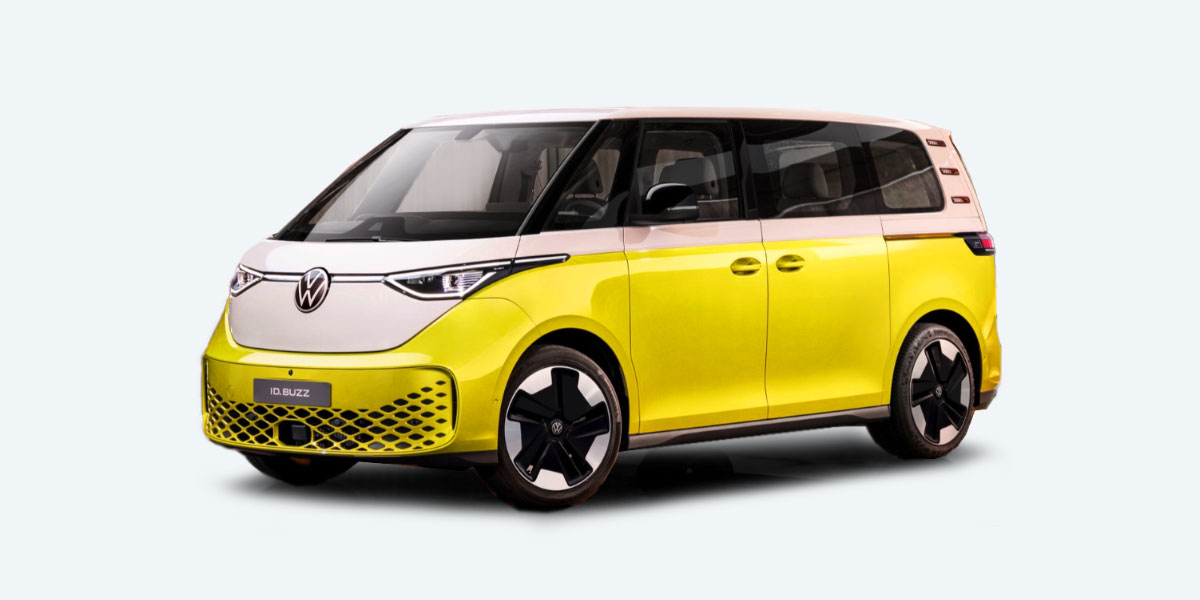
Exterior and Interior photos of Volkswagen ID. Buzz NWB Pure
Volkswagen ID. Buzz NWB Pure Review
Volkswagen's ID. Buzz NWB Pure marks a significant step forward in the evocative journey of reviving the legendary Microbus. This intriguing juxtaposition of retro flair and cutting-edge electric technology presents a delightful aesthetic to electric vehicle enthusiasts.
The Design Legacy: A Mix of Past and Future
The ID. Buzz NWB Pure is an eye-catcher from the outset, borrowing its classic two-tone visage from the iconic Volkswagen Bus. The standout VW badge beaming from its familiar, rounded fascia bestows a blend of nostalgia and contemporary charm. A cozy single-tone hue takes center stage in the Pure trim, distinguishing itself from lively variants like the Pro S Plus. With its shorter length compared to modern minivans and a standard wheelbase, the maneuverability in tight urban jungles is not a concern.
Spacious and Practical Interior
Step inside, and you're immediately greeted by an atmosphere of spatial luxury—attributable to generous windows and a high roof. The cabin plays it sensibly, eschewing opulence for practicality, with robust plastics and straightforward upholstery, echoing its functional ethos. Despite its five-seat layout, the openness is undeniable, compensating for the absence of an additional row.
The Driving Experience: Embracing a Smooth Ride
Underneath its charismatic exterior lies an efficient single rear-wheel-drive electric motor, producing 125 kW (170 hp) of power and 310 Nm of torque. It brings a peaceful driving experience, with acceleration achieving the 0 to 60 mph sprints in just over 8 seconds. It might not be a sprinter, yet its steering is nimbly responsive, making urban navigation a breeze.
Battery: Range and Charging Insights
A robust 63 kWh battery positions the ID. Buzz NWB Pure comfortably in the electrical race. While its 310 km range might not be headline-grabbing by 2025 standards, it holds its own within city and close countryside trips. Charging becomes hassle-free with DC fast charging reaching from 10% to 80% in approximately 30 minutes.
Cargo Capacity and Utility
Though the NWB Pure may lack the extensive storage of its larger siblings, its design invites adaptive use. From family trips to supplying market stalls, the cargo configurations (300-1000 liters) are more than adequate for varied ventures.
Driving Dynamics and Comfort
Despite its van-like form, the drive delivers a commendably planted experience, credit to the low-mounted battery. The ride can feel moderately firm over uneven surfaces, but it never borders on discomfort. A dynamic mix of efficiency and ease is what makes the ID. Buzz NWB Pure enjoyable for those who prioritize steady cruising over brisk acceleration.
Eco-friendliness with a Vintage Nod
The appeal of driving without emissions is compounded by the historical nod to VW’s storied past. The methodology brings heritage into the modern age, making the Eco-ethos an entertaining consideration to environmentally conscious drivers.
Price Point Comparison
Costing approximately $52,300, the ID. Buzz is certainly not the most inexpensive entry-level electric van. While emphasizing panache over opulence, its value lies in nostalgia intertwined with current technology.
The Infotainment Interface
The vehicle features a 12.9-inch infotainment screen, offering essential connectivity. However, the interface is a bit cumbersome, requiring menu exploration for even simple tasks, which may introduce an irritant to an otherwise smooth journey.
Pros and Potential Drawbacks
While the ID. Buzz NWB Pure is attractively wrapped in iconic styling and showcases an impressively spacious interior, the initial trim's simplicity may disappoint those seeking cutting-edge luxury or additional seating. Also noteworthy is its limited driving range compared to competitors like the KIA EV9. However, its eco-friendliness and engaging design will likely put a smile on enthusiasts' faces.
The Volkswagen ID. Buzz NWB Pure encapsulates character-filled electric ingenuity, appealing to urban families and eco-conscious drivers wishing for a mix of character and modernity. Simplistic, yet stylish—it's not your ultimate goal-chasing EV, but a charming partner with an enduring allure.
Watch the Video Overview
F.A.Q. about Volkswagen ID. Buzz NWB Pure
What is the range of ID. Buzz NWB Pure on a single charge?
The Volkswagen ID. Buzz NWB Pure has a claimed range of around 260-291 miles (418-468 km) under optimal conditions. Real-world figures may vary between 200-230 miles (322-370 km) depending on factors like weather, driving style, and load.
How long does it take to fully charge an electric vehicle?
For the ID. Buzz NWB Pure, charging from 10% to 80% via a DC fast charger can take about 30-35 minutes. Using a 240V home setup, a full charge could take 8-10 hours.
Are electric vehicles more expensive than gasoline cars?
The starting price of the VW ID. Buzz NWB Pure is approximately $52,300, or €49,990. While initial costs can be higher than gasoline vehicles, lower running and maintenance costs can offset this over time.
What is the battery capacity?
The Volkswagen ID. Buzz NWB Pure features a battery capacity of 63 kWh. This capacity offers a balance of range and efficiency for urban driving and short road trips.
What is top speed?
The top speed of the Volkswagen ID. Buzz NWB Pure is not explicitly specified, but it is designed for smooth cruising rather than high-speed performance. Generally, such vehicles are limited to around 90-100 mph (145-161 km/h).
What is the price of Volkswagen ID. Buzz NWB Pure?
The Volkswagen ID. Buzz NWB Pure is priced at approximately $52,300 USD. This translates to around €49,990, making it a competitively priced entry-level EV for its class.
How safe are electric vehicles in accidents?
Electric vehicles like the ID. Buzz NWB Pure are designed with safety in mind, often rated highly in crash tests and equipped with modern safety systems. Their lower center of gravity enhances stability during an impact.
What are the environmental benefits of electric vehicles?
Electric vehicles like the Volkswagen ID. Buzz NWB Pure offer zero-emission driving, reducing greenhouse gas emissions and dependence on fossil fuels. They also contribute to improved air quality, especially in urban areas.
Can electric vehicles be charged with renewable energy?
Yes, electric vehicles, such as the Volkswagen ID. Buzz NWB Pure, can be charged using renewable energy sources if the charging station or home setup is powered by renewable electricity, such as solar or wind power.
Comparison:
Volkswagen ID. Buzz NWB Pure is carving its niche in the realm of electric multiverses with playful aplomb. With its iconic silhouette, it nods vigorously to the past while steering firmly into the future. But how does this charming MPV stack up against its sparring partners like the Kia EV6 Air, Hyundai Ioniq 5, Ford E-Transit Custom, and Nissan Ariya Engage? Let us sally forth into the electric twilight in which bytes and watts intertwine with pistons and gears.
Range and Battery:
The Volkswagen ID. Buzz NWB Pure boasts a respectable range of 193 miles (310 km) on a 63 kWh battery, which positions it comfortably in the mid-range echelon. Meanwhile, the nimble Kia EV6 Air extends its electric wanderlust to an exhilarating 310 miles (499 km) with a 77.4 kWh battery. The Hyundai Ioniq 5 also flaunts its prowess with a similar potential, offering up to 303 miles (488 km). On the workhorse front, the Ford E-Transit Custom, aimed at urban deliveries, chugs along with a modest 126 miles (203 km). Not to be underestimated, the Nissan Ariya Engage strikes a robust balance with up to 216 miles (348 km) on its 63 kWh power pack.
Acceleration and Power:
Expect the Volkswagen ID. Buzz NWB Pure to amble from zero to 60 mph in over 8 seconds. It delivers a gentle tap rather than a lurch, clocking in at 170 horsepower. It's aligned with the family vibe rather than speedway showdowns. In a different paddock, the sprightly Kia EV6 Air pounces with 226 horses, while the futuristically styled Hyundai Ioniq 5 conjures 225. And while the Ford E-Transit Custom focuses on utility, its robust 136 hp doesn't dawdle in city confines. However, the Nissan Ariya Engage nips at the heels with a humble, yet competent, offering of 214 horsepower.
Charging Time:
Don't fret if you've sauntered down the cell's reserve – the ID. Buzz NWB Pure tops its charge leisurely in 8 to 10 hours on a home AC setup. On vacation at 125 kW DC chargers, it gets going from 10% to 80% in a mere half-hour. The Kia EV6 Air and Hyundai Ioniq 5 flaunt their impressive reciprocity at rapid 350 kW stations, taking barely 18 minutes for the same fullening feat. Yet, the Ford E-Transit Custom and Nissan Ariya Engage both seek slightly longer sessions, around 40 minutes, at their respective 115 kW and 130 kW charging speeds.
Price:
The balance of your wallet will tremble at a terse $52,300 / £42,600 / €49,990 for the Volkswagen ID. Buzz NWB Pure. The Kia EV6 Air and Hyundai Ioniq 5, nigh identical in elegance, gesture towards the $47,000 / £38,200 / €45,000 mark. Yet the Ford E-Transit Custom, less fanciful in façade, braces at a workmanlike $38,500 / £31,300 / €36,800, perhaps fitting for the local entrepreneur. The Nissan Ariya Engage, singing to a divergent tune, stretches slightly further to a comfortable $55,000 / £44,700 / €52,000, proving that elegance often comes with an extra pinch of asking price.

